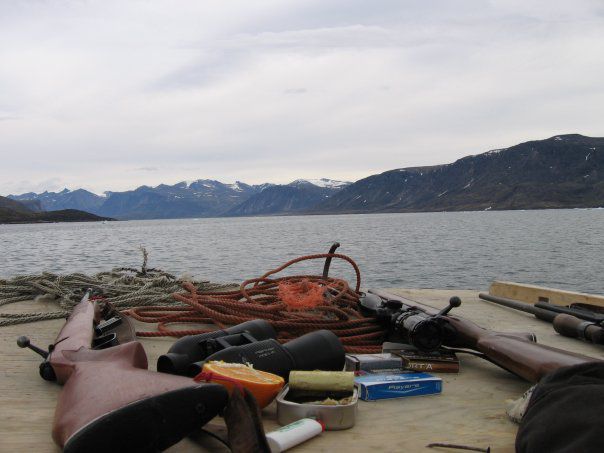Nunavut Mayors’ Forum Passes Motion Opposing Seismic Surveys
by Warren Bernauer
The mayors of Nunavut’s Qikiqtani (Baffin) region passed a motion opposing offshore oil and gas exploration at the 2014 Baffin Mayors’ Forum. The motion was passed unanimously, with all thirteen mayors of the region voting in favour.
The motion states, “the people have expressed concerns of the [oil and gas] activities that can have adverse affects on the ecology of our offshore region, and our hunter gatherer society”.
“The Mayors of Baffin Island are opposed to oil & gas activity, including seismic testing in Davis Strait & Baffin Bay until such time when our concerns have been met and Inuit can be full participants of such activity.”

A motion opposing offshore oil and gas development was passed at the 2014 Baffin Mayors’ Forum, held March 4-6 in Iqaluit. The motion is in response to a proposal for a seismic survey off the coast of Baffin Island. The proposal is being assessed by the National Energy Board. The company has begun posting job openings in local media, with an expected August 2014 start date for the project.
The motion is a response to a proposed seismic survey in Davis Strait and Baffin Bay. The proposal was submitted in 2011 by a consortium of three companies – TGS-NOPEC Geophysical Company ASA, Petroleum GeoServices and Multi Klient Invest AS. The 2011 Northeastern Canada 2D Marine Seismic Survey would take place seasonally over five years, and is intended to identify potential oil deposits below the ocean floor.
This work would involve a ship using air guns to blast loud bursts of sound under the water. Sensors would then detect and record the way sound bounces off the ocean floor, providing information about underwater geology. The data collected would then be sold by the consortium, to the oil industry, which would use it to locate potential oil and gas deposits to begin exploratory drilling. The proposal is currently being assessed by the National Energy Board (NEB).
The Mayors’ Forum motion comes on the heels of repeated opposition to the proposal by Inuit on Baffin Island . In Clyde River, the Hamlet Council and Hunters and Trappers Organization have passed two joint motions, opposing the proposal. Residents of Clyde River and Pond Inlet have submitted petitions to the NEB. In 2013, the NEB held community hearings in Pond Inlet, Clyde River, Qikiqtarjuaq, and Iqaluit. At each meeting, significant opposition and concern was expressed by members of the public.

Map taken from Google Maps, with an overlay from BASICSNews.ca.
The proposal overlaps with important habitat and migration routes for various species of marine mammal Inuit harvest for subsistence. The offshore fishing grounds for Nunavut’s commercial fishery also overlap with the proposed survey lines. This has led to serious concerns that the loud noise emitted during surveys may alter the migration routes or physically damage the hearing of marine mammals. It has likewise caused concern that the surveys may cause fish to disperse, causing reduced catches for the local commercial fishery. The commercial fishery is an important source of employment for Inuit in the region.
Some opposition to the proposal is related to the oil and gas extraction the seismic survey is intended to help facilitate. At the NEB public hearings, several residents of the region expressed concern that offshore oil and gas drilling may damage the environment, especially in the case of an accident. A further concern was that, because Inuit do not possess resource rights to offshore resources through the Nunavut Land Claims Agreement, Inuit would not substantially benefit from offshore oil and gas development.
These broader concerns with opening the Baffin region to oil development are not considered in the NEB assessment, due to its narrow assessment of cumulative impacts. The scope of the NEB assessment states that consideration of the cumulative effects of other activities “will be limited to those for which formal plans or applications have been made.”
Because these broader concerns are not being addressed in the NEB assessment, Nunavut’s Inuit organizations have requested a Strategic Environmental Assessment (SEA) be conducted prior to approving the proposed survey. Aboriginal Affairs and Northern Development Canada began the initial stages of an SEA in February of 2014. The SEA would presumably examine the wisdom of opening the Baffin region to offshore oil and gas development.
However, the NEB has indicated that the SEA will have no effect on its assessment of the proposed seismic survey. The NEB is currently in the process of analyzing submissions, and is expected to reach a decision on the file in the coming months.
Meanwhile, the consortium has begun advertising job openings for the proposed project in local media. According to one advertisement, “Work is planned to commence in August 2014”.
This story originally appeared in the Media Co-op, and has been republished here with the author’s permission.
Comments